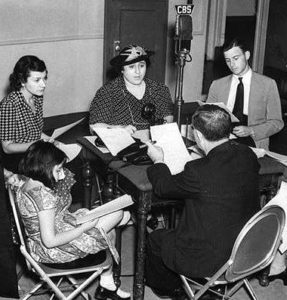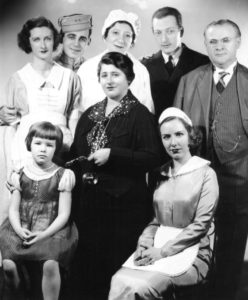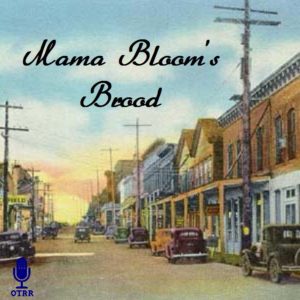The United States welcomed a wave of immigrants from the 1880s to 1920s, and foreign accents were a huge part of everyday life in the U.S. well into the twentieth century. In big cities, that usually included the Yiddish accents of some of the millions of Ashkenazic Jews who arrived in those years.
Network radio in the U.S. began in 1926. As a result, immigrant roles were a staple of early radio… sometimes played for laughs and sometimes portrayed as multidimensional human beings.
The Goldbergs

Series creator and star Gertrude Berg (center) with cast members from the CBS run of THE GOLDBERGS, probably mid to late 1930s.
Radio’s pioneer of well-developed Jewish immigrant characters was Gertrude Berg, who wrote and starred in The Goldbergs. This series, which ran from the 1920s to 1950s, premiered on NBC in 1929 as The Rise of the Goldbergs. It began as a weekly slice of life about Yiddish-accented Molly and Jake Goldberg and their American kids, Sammy and Rosalie. For most of the run, they lived in a Jewish immigrant neighborhood in the Bronx, and Jake worked in the garment industry. Molly Goldberg’s Uncle David (played by Yiddish theater star Menasha Skulnik) lived with the family.
NBC quickly expanded it into a daily soap opera about the sorrows and joys of the Goldbergs and their friends, relatives, sweethearts and coworkers. The family observed Jewish holidays — there were episodes depicting Seders and High Holiday services — but religion did not seem central to their lives. The action occasionally went beyond the city to a fictional Jewish resort in the Catskill Mountains, much like the vacation spot that Berg’s parents had run when she was young. The series had a large Jewish and non-Jewish following.
The Goldbergs had remarkable staying power. Except for one 18-month break, it would air as a soap opera from 1929-45 (five 15-minute episodes a week for most of those years). It then returned as a radio sitcom from 1949-50 and as a TV sitcom from 1949-55. There was also a Molly Goldberg movie and stage play, and several books based on the characters.
During the show’s 1934-35 hiatus, Berg wrote and starred in another Jewish “ethnic series”: House of Glass, a weekly half-hour drama in which she played the owner of a hotel in the Catskills.

Cast of the 1935 run of HOUSE OF GLASS, an NBC series about life at a Jewish resort in the Catskills. It would return in 1953-54 with a different cast, again with Gertrude Berg (center) as its writer and star.
With the possible exception of one episode, no recordings of the Goldbergs shows from 1929 to 1937 are known to survive, and hardly any exist from before the 1940s. Most of what survives from the pre-sitcom days is in dicey sound quality and reflects the slow pacing of some early serials. Here is a recording from 1942:
The Goldbergs – April 21, 1942 – A stern lecture – 14 minutes.
Mama Bloom’s Brood
While some famous shows such as The Goldbergs were poorly preserved, some obscure series survive in complete or nearly complete form. In order to hear what a Goldbergs-like show from the 1930s sounded like, we turn to the charming, largely forgotten Mama Bloom’s Brood. Clearly patterned on Berg’s successful series, it contained more humor and was less “soapy.”
Little is known about this 15-minute series, not even its cast or writers. It was prerecorded in the Los Angeles area around the mid-1930s (possibly 1934 or 1937) and was sold to individual stations on discs. It aired in some U.S. cities as late as 1939, and in Australia in 1944. Almost all of its seventy-some episodes survive in good sound.
Mama and Papa Bloom may be stereotypes, but they feel like a Jew’s own stereotype of Jewish immigrants. After all, I can’t imagine many non-Jewish writers or actors in 1930s America thinking to have the father, Jake, wander around humming “Hatikvah” under his breath.
So let’s listen to this lovely slice of American Jewish life: the episode in which Mama and Papa drive to the hospital to meet their new grandchildren:
Mama Bloom’s Brood – mid-1930s – Going to the hospital – 13 minutes.
Dozens of other episodes can be heard on the Internet Archive’s Mama Bloom’s Brood page.

